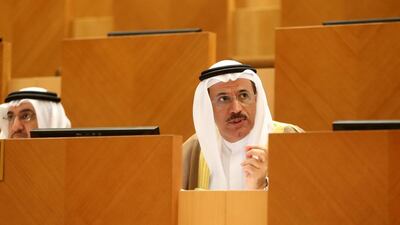A new anti-fraud bill was passed yesterday by the Federal National Council after a long debate over free-zone regulations.
Members debated with Sultan Al Mansouri, the Minister of Economy, about whether free zones were subject to UAE laws and whether that should be specified in the new law.
The second article of the law refers to commercial counterfeiting. However, the committee that revised the law added a phrase applying to companies “inside the country which includes free zones”.
Mr Al Mansouri objected to adding free zones into the law because that would imply the 30 free zones are not part of the state.
He argued that many previous laws do not mention free zones specifically but the laws are obviously applicable there. So if they were to mention free zones now, that would mean the laws that do not mention free zones do not apply to them.
Ali Al Nuaimi (Ajman) agreed with the minister, “but this law has a special nature and it is important to identify what it includes”, he said.
Ahmad Al Shamsi (Ajman) said many laws did not apply to free zones, so it was essential to stress that the new law applies.
“Free zones are industrial areas that are concerned with products, so if the products are not up to standards, do we want to export them?” said Mr Al Shamsi.
Moreover, since the phrasing said “inside the country which includes free zones”, it was clear that free zones are part of the UAE and there was no harm in doing that, he said.
Marwan bin Ghalita (Dubai) said the ministry had issued a report that said “their first challenge was applying laws on free zones”.
Ahmad Al Zaabi (Sharjah) asked: “If I say a crime occurred at a free zone does that mean the penal code does not apply there? We are talking about a law text and it is faulty – as if we divided the country and kept free zones outside.”
The minister said he was concerned that adding free zones specifically to the law was unconstitutional. He suggested the phrasing be changed to match that of the weapons law, which says, in part, “inside the country and it does not exclude the free zones inside the country from the verdicts of this law”.
It is not unusual for some laws to be suspended in free zones in order to attract investors.
“A free zone is a piece of the state’s land that does not undergo some of the state’s laws ... so we need to add this to confirm it,” said the FNC’s legal adviser.
The members and the minister subsequently approved the committee’s suggestion to include the mention of free zones.
Earlier in the session, the members and the minister said it was necessary to add counterfeit services to the definition of “commercial counterfeit” in order to criminalise such acts.
Mr Al Mansouri said everything could be classified under service, such as that of a doctor serving a patient. And he wanted to know how the ministry could be responsible for all services provided in the country.
After a long debate he said it was possible to add the definition, as long as each sector was responsible for the services that fell under it.
Other suggested changes agreed on during the session include an addition to the committee’s version of Article 7. It says those who received orders to close their businesses can appeal within five days after notification, and the higher committee must issue its decision within three working days from the date the appeal was lodged.
The minister said this might put a lot of pressure on the ministry and there might not be time, so he suggested adding this phrase: “And the higher committee can assign some of its authorities to some of its members.”
The council approved the addition.
Finally, the session agreed that the Cabinet should issue its bylaw and appropriate decisions to execute the law within six months.
hdajani@thenational.ae


